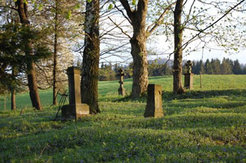The Catholic Church and Religious Pluralism in Lithuania and Poland: An Anthropological Study of Public and Private Meanings of Religion in Postsocialist Society
Researchers
Ingo Schröder
Assoziierter
Lina Pranaityte-Wergin
Doktorandin
Kinga Sekerdej
Assoziierte
Agnieszka Pasieka
Doktorandin
International partner institutes
Social Anthropology Center, Vytautas Magnus University, Kaunas
Department of Sociology, Jagiellonian University, Kraków
Project Description

Despite a similar history of a dominant Catholic Church and a cultural heritage shaped by the Catholic faith, the religious fields of Lithuania and Poland have developed in different directions after the demise of socialism. In Poland, the Church continues to play a dominant role in politics and everyday life. There has even been a reinforcement of popular religiosity through the widespread veneration of Pope John Paul II. In Lithuania, an opposite tendency can be observed. While the overwhelming majority of Lithuanians are members of the Catholic Church (‘statistical Catholics’), a widespread indifference toward the Church’s teachings, the rise of religious pluralism and the proliferation of individualized constructions of religious worldviews under the influence of esoteric and New Age ideas have been observed in that country.

The project is concerned with examining such general tendencies within the religious field through a long-term ethnographic study of people’s everyday social worlds. We are interested in understanding how people create religious meaning under conditions of rapid change in the wider economic and political fabric of society and through the experience of their everyday lives. The Catholic Church and Catholic faith constitute a powerful framework of institutions and culture that is interwoven in multiple ways with power relations and social networks, but people’s agency within this structural framework encompasses a wide variety of responses ranging from faithful approval to rejection and individual bricolage. For a theoretical framework the project draws mainly upon Pierre Bourdieu’s concepts of the religious field, the religious habitus, and religious capital. One of our goals is to examine how the Bourdieuan approach works in the context of East European transformation societies.

